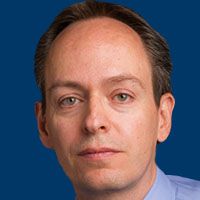Video
Dr. Contreras on the Role of Neoadjuvant Pembrolizumab in Desmoplastic Melanoma
Author(s):
Carlo Contreras, MD, discusses the role of neoadjuvant pembrolizumab for the treatment of patients with desmoplastic melanoma.
Carlo Contreras, MD, a surgical oncologist for Skin and Soft Tissue Cancers, a member of the Translational Therapeutics Program, medical director of Ambulatory Services at The Ohio State University Comprehensive Cancer Center (OSUCCC)–James, and an associate professor in the Division of Surgical Oncology at The Ohio State University, discusses the role of neoadjuvant pembrolizumab (Keytruda) for the treatment of patients with desmoplastic melanoma.
The phase 2 SWOG 1512 trial (NCT02775851) evaluated the efficacy and safety of pembrolizumab in patients with desmoplastic melanoma. The trial included patients with both resectable and unresectable disease.
In cohort A, patients with resectable desmoplastic melanoma received 200 mg of intravenous pembrolizumab once every 3 weeks for 3 cycles in the neoadjuvant setting, and, if they were eligible for resection, then proceeded to surgery. Those who experienced progression received 1 more cycle of pembrolizumab. In cohort B, patients with unresectable desmoplastic melanoma were given pembrolizumab once every 3 weeks for up to 34 cycles, or until disease progression or unacceptable toxicity.
Data presented at the 2022 ASCO Annual Meeting showed that among 29 patients with resectable desmoplastic melanoma, the pathologic complete response rate was 55%, meeting the primary end point of the trial. As of data cutoff, the median overall survival was not yet reached.
When considering the pivotal SWOG 1512 trial, findings also need to be taken in context with the phase 2 SWOG 1801 trial (NCT03698019), which evaluated adjuvant pembrolizumab alone vs neoadjuvant and adjuvant pembrolizumab in patients with stage III or IV, high-risk melanoma, Contreras explains.
When looking at the all-comers with cutaneous melanoma enrolled in SWOG 1801 and the specific population with desmoplastic melanoma in SWOG 1512, these patients achieved promising response rates to adjuvant immunotherapy, Contreras continues. Given these results, clinicians could individualize the extent of the operation after neoadjuvant therapy, based on the response of a given patient, Contreras concludes.









